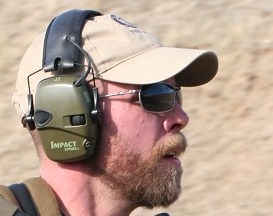Gabe Herron: In your short story “Real Work” we’re introduced to an Afghan war veteran who’s worked in the mortuary complex at Bagram air base. You’ve juxtaposed his grim duties at Bagram with his life in Portland, Oregon post active duty. These two worlds seem in direct contrast, but you’ve linked them though his sense of smell. I was wondering if you could tell me a little more about that connection.
Andy Edwards: A question of sense perception. It sort of goes to ‘if a tree falls in the forest does anyone hear it?’ If bodies turn to slop as a result of actions in modern war and someone has to deal with that do we give a shit? Thanks to the propaganda mechanisms and the century-old system of indoctrination we call schooling–as well as the reality of bills to pay–thanks to this combination, all you hear is what you’re supposed to hear, usually in the sterile pablum that serves as news. Unless you go seeking. I like to think that the character in that story would eventually work through the lingering smell phenomena and wake up to the larger decay around him. Of his own mind, of the city itself. Not in the abstract but at the obvious levels of sense perception and morality. We’re conditioned not to investigate and to turn off our curiosity. To make the donuts, as it were, instead of asking Why are we making the donuts? The connection between the two worlds of the disgusting morgue situation in Afghanistan and the gears of an American city, even one as interesting and enjoyable as Portland, is in fact not at all abstract. The link between empire expansion abroad and the luxury to ignore it at home is as material as that tree falling.
GH: So, by confronting the reader with some of the sensory details of that specific work environment, your aim was to remove some of that luxury? Is that why you used the title as a sort of chorus throughout the piece?
AE: Honestly, I didn’t have any aim with it at all. At least not consciously. Although I suppose that is maybe part of the effect. The luxury thing is inherent to trying to describe this scenario accurately. You go back and forth between shit/work and that thing/luxury that doing the shit affords you. Then back to the same shit to get more luxury. As far as the reader’s experience, I’m honestly not sure how it functions. You’d have to tell me.
GH: I don’t know what the hell I’m talking about. I just had this flash when I was reading your answer to the first question that the reason you were using the title as a chorus was to draw attention to the fact that all our supposed “work” our “collective economic reality,” is supported by this other work, or “real work” that is done by a warrior class that mostly remains silent, or is kept silent. This dirty, filthy, stinking, rotten work that keeps oil prices low, and our borders open for commerce; all good things, on the one hand, if you are American, but also not so good if you are brown and born atop a natural resource governed only by corruption. The trouble being, we don’t see the real cost of this “real work,” or ever get the stink of it up our noses. (Unless we read a story like this one.) So, we can never ascertain for ourselves, is the price we pay for something worth the cost? All of this to say…your fiction is working overtime, and working very well, at least in my head.
AE: Now that I hear your expansion on that idea and think about it some I think you must be right. At the same time, I really never did think of much of anything when I wrote the piece and the truth is the only things I really edit or think about as I write are the flow, just the way it reads and looks on the page and then I think a lot about the symbolism usually (which I honestly don’t think anyone considers anymore as even remotely interesting or useful). Also, I think about the total from beginning to end, more from a 30K foot view. So going back, I probably avoid the question to avoid thinking about my approach too much.

GH: Your character isn’t directly involved with combat but rather dealing with the results. I’ve read that mortuary affairs personnel have some of the highest rates of post-traumatic stress disorder. Do you think your character is dealing with PTSD?
AE: It could go either way. You’re right about the mortuary folks. How could you not develop some baggage dealing with liquified bodies on any regular basis? I don’t know, maybe it’s possible to just do the job and compartmentalize the horror. Though with this particular character, I like to think that there’s something perhaps even more inhuman going on and it’s that he experiences the total detail of the hellish thing and yet just drives on. I say inhuman not as a pejorative, but rather simply to describe his capacity to keep going in the present context. We are conditioned to make a bigger deal of things than they are. And in this way we are participants in our own perpetuated infantilism. The fact of the matter is that our forerunners dealt with brain matter, pus, blood and all manner of imaginable nastiness on a routine basis and did so with little more than a grunt.
GH: That’s interesting. You say there’s something almost inhuman going on. In other survival writing I’ve read, survivors often describe an experience of becoming robot-like, capable of enduring almost any level of pain, horror, and hardship in order to perform the next necessary survival task–no matter how grim. It’s almost universally described by them as an inhuman driving force. It sounds like this character is having some trouble turning his “humanity” back on.
AE: When I start thinking it about it, yes, he’s having humanity issues. But also he’s special in my mind because he already had humanity issues (like everyone else) and had prior to the war found a way to be of service to the other bedraggled and gut-kicked people around him. That’s just what I know about him: that he can go on and on and on and the cost of that is that he winds up like everyone else. In some other universe or dimension he would have been afforded the latitude to use his powers of perseverance to seek something higher. That’s why I ultimately like my character in this story. He’s human under twofold, weird circumstances and I admire him because he doesn’t snap, but I also feel sorry for him because his true potential is wasted on pedestrian bullshit and political emptiness.
Gabe Herron lives outside a small town near Portland, Oregon with his wife and son. His poetry has appeared in The Green Hills Literary Lantern, and he has stories forthcoming in The MacGuffin, Hobart, and Menacing Hedge. He has worked at the same bookstore for thirteen years.
Andy Edwards is a writer and tracking instructor. He lives at the end of the Applegate Trail in southern Oregon. His work has been published or is forthcoming in r.kv.ry. quarterly, deComp Magazine and Shadowbox Magazine.


Pingback: Real Work | Rkvry Quarterly Literary Journal
Pingback: “Real Work” by Andy Edwards | Rkvry Quarterly Literary Journal